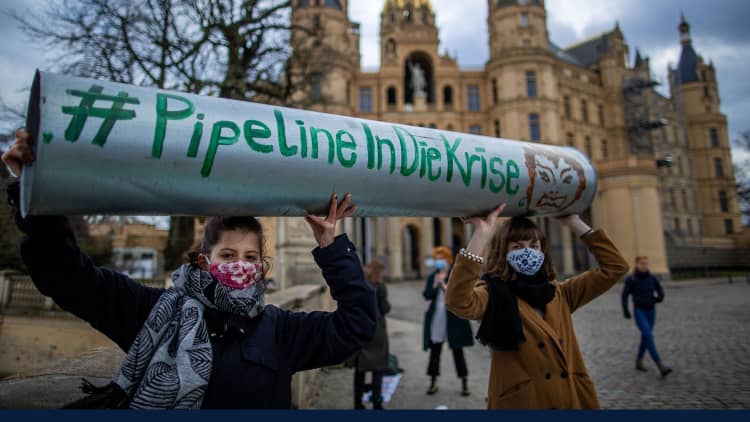
LONDON — A simmering dispute over an undersea pipeline that would bring gas from Russia to Germany is expected to intensify in the coming weeks, with pressure building on President Joe Biden to do more to halt the nearly-complete project.
If finished, the 1,230-kilometer (764-mile) Nord Stream 2 pipeline will become one of the longest offshore gas pipelines in the world. It is designed to deliver Russian gas directly to Germany under the Baltic Sea, bypassing Ukraine.
Alongside several European countries, the U.S. opposes the pipeline, calling it a "bad deal" for European energy security.
Critics also argue the pipeline is not compatible with European climate goals and will most likely strengthen Russian President Vladimir Putin's economic and political influence over the region.
Led by Russia's Gazprom, the state-owned gas giant has claimed Nord Stream 2 is "particularly important" at a time when Europe sees a decline in domestic gas production. Advocates of the pipeline also condemn attempts "to influence or stop the project for political reasons."
A bumpy road ahead for the project includes the threat of further targeted sanctions led by the U.S., Germany's federal election in late September and an ongoing backlash over the poisoning and arrest of Russian opposition politician Alexei Navalny.
What's at stake?
"The reason it is so geopolitically contentious is not necessarily about the pipeline or the molecules themselves. It has everything to do with timing and what it says about Europe's relationship with Russia, Germany's relationship with Russia and trans-Atlantic relations," said Kristine Berzina, a senior fellow at the Alliance for Securing Democracy, a national security advocacy group.
"The pipeline will either be built or it will not be built. Germany has a role in potentially killing it. Russia is finding alternatives getting around sanctions so that it can be completed but not very much of this pipeline remains," Berzina told CNBC.
The project is 94% complete, with over 1,000 kilometers of the pipeline in place and less than 150 kilometers to go before Gazprom can then turn on the taps.
One potential stumbling block, analysts say, could be the prospect of a German government that's opposed to the pipeline. The next general election, due to be held on Sept. 26, will determine who will succeed Angela Merkel as the country's chancellor.
The problem, however, is the project is so close to completion that September may be too late to scrap the pipeline.
"We could well be done with the pipeline by September and, if the pipeline's done, the gas will flow and I think it will be especially difficult to cut off the gas once you actually finish the pipeline. So, we're at a very critical few months, weeks even, to determine whether this product is going to continue or not," Berzina said.
Is Nord Stream 2 inevitable?
Timothy Ash, senior emerging markets strategist at Bluebay Asset Management, told CNBC that the potential for further interventionist measures may yet prevent the delivery of Russian gas to Europe via Nord Stream 2.
When asked whether the completion of the pipeline was inevitable, Ash replied: "It seems that way, albeit given the threat from sanctions on insurance contracts I wonder whether any actual gas will be able to flow (through) the pipeline."
The nature of the dispute, Ash said, was partly about gas supplies to Europe, given the U.S. "clearly" wants to supply the continent with liquefied natural gas, but there are broader geopolitical concerns at play.
"It's also the sense from the US, that Europe does not meet its security commitments. It asks the US for security guarantees, but at the first opportunity sells out to Russia," he added.
Where do we go from here?
James Waddell, senior global gas analyst at Energy Aspects, told CNBC that U.S. sanctions will be "one of the main impediments" to the completion of Nord Stream 2.
Waddell cited measures taken last month when the U.S. announced targeted sanctions against Russian pipe-laying vessel Fortuna in a bid to delay the project. Notably, the measures stopped short of punishing any German or European firms aiding the construction of the pipeline.
Nonetheless, Russia has been trying to "Russia-fy" the project, Waddell said, effectively trying to insulate companies that don't have dealings with the U.S., don't have U.S. employees and don't require access to dollar-based lending.
In practice, that means Russia finding its own vessels to do the actual physical work of laying the pipeline and transferring the assets and the pipeline vessels to Russian-owned companies.
Waddell said he had doubts about whether Moscow could insulate the project "in its entirety," since many European companies are already tied up with the project and other international companies are likely to think twice about their involvement to avoid finding themselves on a U.S. sanctions list.
In addition, analysts at Energy Aspects said the withdrawal of the project's main certification company in December was another "major" issue.
Norway-based DNV had been due to verify the safety and technical integrity of the pipeline system on completion but the risk management and quality assurance firm suspended its work on the project late last year amid fears of being sanctioned by the U.S.
"This project has all been built to those standards of that certification company and its maybe difficult to find another internationally recognized certification company to step in and certify this project as ready," Waddell said. "And we think without that type of certification it may become difficult for any European regulator to actually allow flows through that pipeline."
— CNBC's Tom Chitty contributed to this article.


